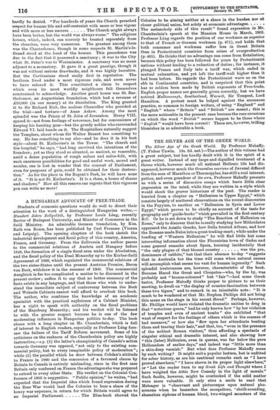A HUNGARIAN ADVOCATE OF FREE-TRADE.
Students of economic questions would do well to direct their attention to the work of a distinguished Hungarian writer,— Hundert Jahre Zollpolitik, by Professor Louis Ling, recently Rector of Budapest University, and Minister of Commerce in the Sail' Ministry. An admirable German translation, by Knn. Bath von Rosen, has been published by Carl Fromm° (Vienna and Leipzig). The opening chapters of the book sketch the industrial development and fiscal policy of this country, America, France, and Germany. From the Zollverein the author passes to the commercial relations of Austria and Hungary before 1848, the formation of a single fiscal area under the Absolutism, and the fiscal policy of the Dual Monarchy up to the Knrber-Szell Agreement of 1899, which regulated the commercial relations of the two sister-States until the present Austrian Premier, Baron von Beck, withdrew it in the summer of 1906. The commercial Anegleich is far too complicated a matter to ho discussed in the present review ; suffice it to say that no better summary of the facts exists in any language, and that those who wish to under- stand the immediate subject of controversy between the Beck and Wekerle Cabinets cannot well afford to overlook this book. The author, who combines the knowledge of an academic specialist with the practical expkience of a Cabinet Minister, has a right to speak with authority on the fiscal problems of the Hapsburg Monarchy; and his verdict will be listened to with the greater respect because he is one of the few moderating influences in Hungarian politics to-day. The book closes with a long chapter on Mr. Chamberlain, which is full of interest to English readers, especially as Professor Ling fore. saw the failure of the Tariff Reform movement. Some of his criticisms on the rashness of the Chamberlain policy are highly instructive,—e.g. (1) the latter's championship of Canada's action towards Germany was opposed, "not only to the existing com- mercial policy, but to every imaginable policy of moderation "; while (2) the parallel which he drew between Cobden's attitude to France in 1860 and the concession of a favoured clause by Britain to Canada is entirely misleading, since in the first case Britain only conferred on France the advantages she was prepared to extend to every other State. His verdict on the Colonial Con- ference of 1902 is suggestive. "Public opinion," he writes, "had expected that the Imperial idea which found expression during the Boer War would lead the Colonies to bear a share of the heavy war expenses, in return for which Britain would agree to
an Imperial Parliament The Blue-book showed the Colonies to be aiming neither at a share in the burden nor at closer political union, but solely at economic advantages.. • • • The melancholy side of this result" found expression in Mr. Chamberlain's speech at the Mansion House in March, 1903. Professor Ling regards the position of our workmen as superior to that of French or German workmen (p. 471), and holds that both consumer and workman suffer less in Great Britain than in Protectionist countries from crises of overproduction (p. 485). He thinks that no advantage can come from Retaliation, because this policy has been followed for years by Protectionist nations without leading to a reduction of duties ; for instance, it plunged France and Italy into a tariff war, which ended in mutual exhaustion, and yet left the tariff-wall higher than it had been before. He regards the Protectionist wave as on the ebb in Continental countries, and is surprised that this point has so seldom been made by British exponents of Free-trade. English proper names are generally given correctly, but we have noticed Malbourough, Southerland, Warwik, Sir Tempest, Lord Hamilton. A protest must be lodged against the erroneous practice, so common to foreign writers, of using "England" and "English" where "Britain" and "British" are meant ; this is the more noticeable in the present case because the rare occasions on which the word "British" occurs happen to be those where "English" would have been correct! These are, however, trifling blemishes in so admirable a book.






















































 Previous page
Previous page